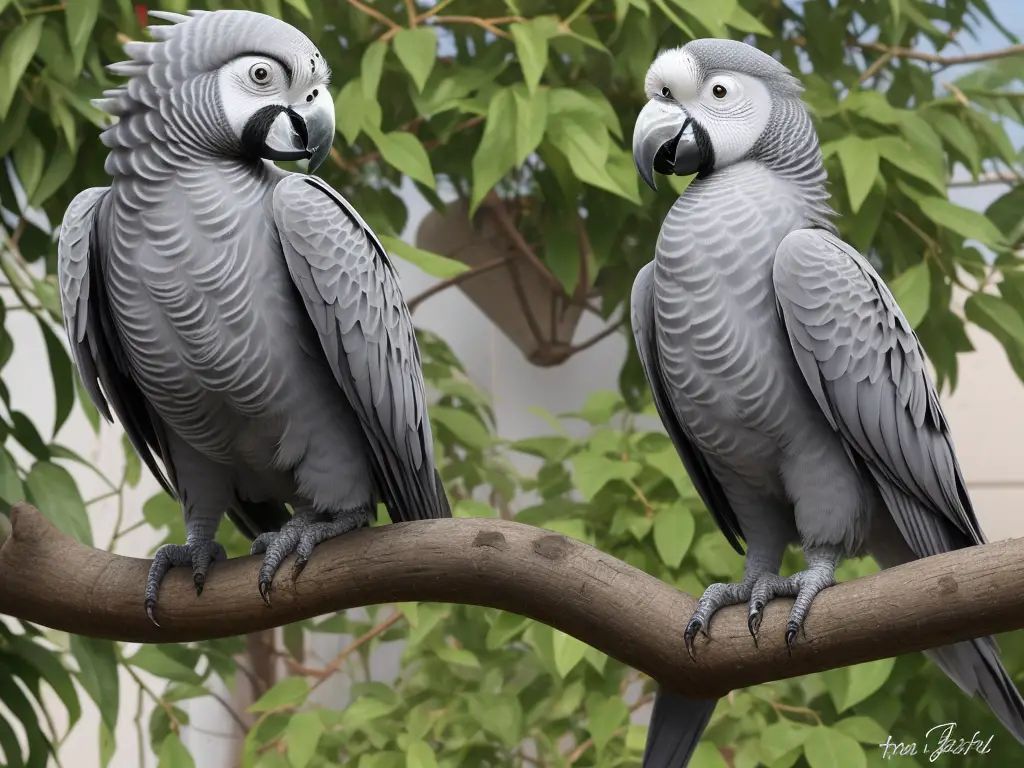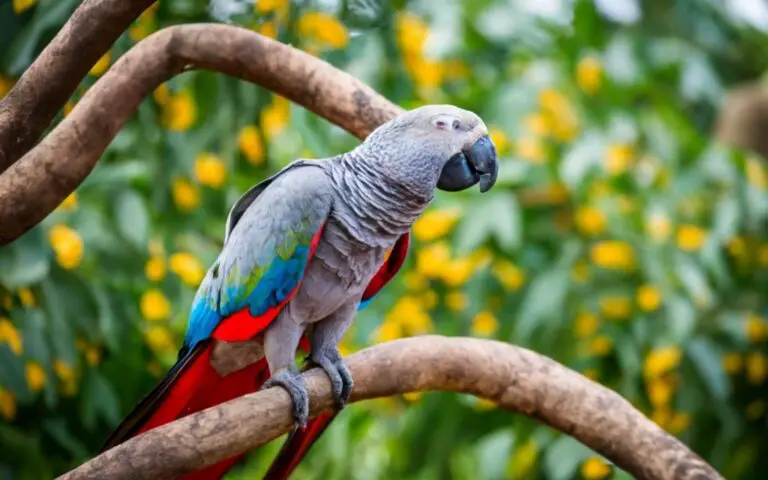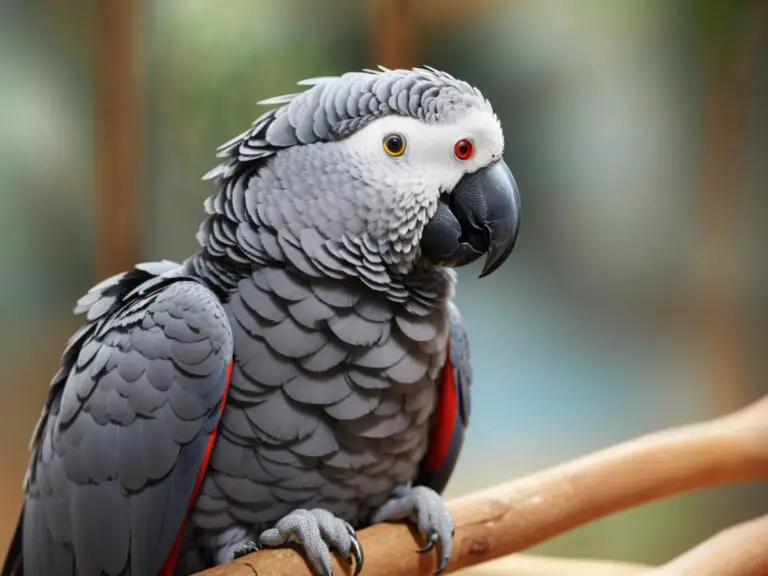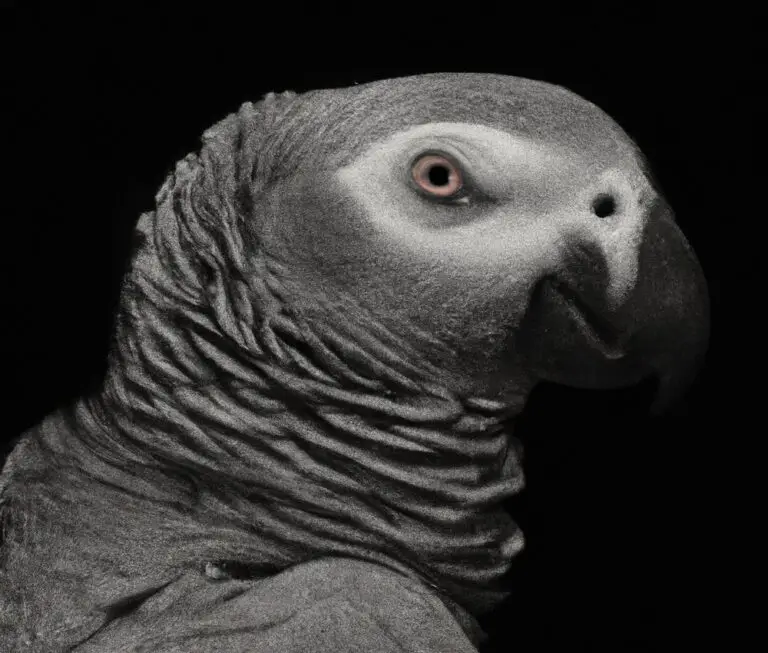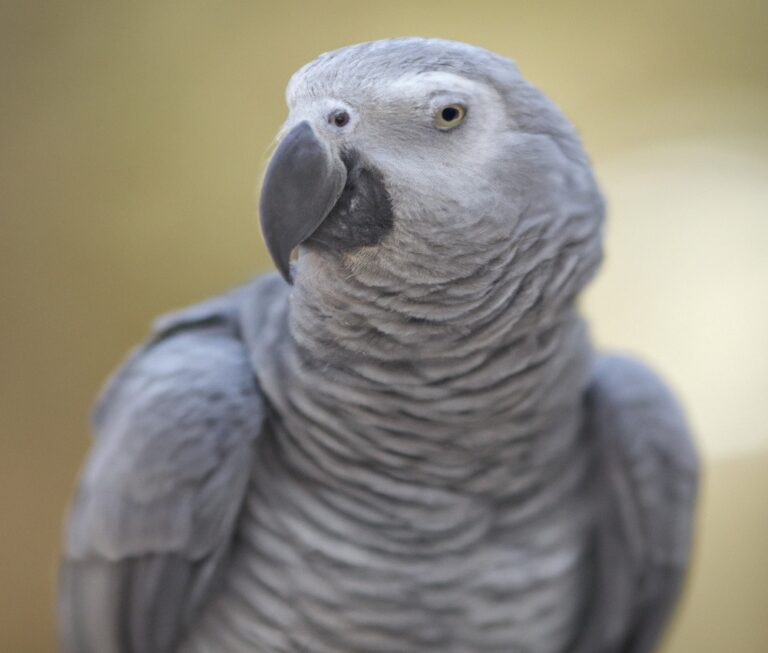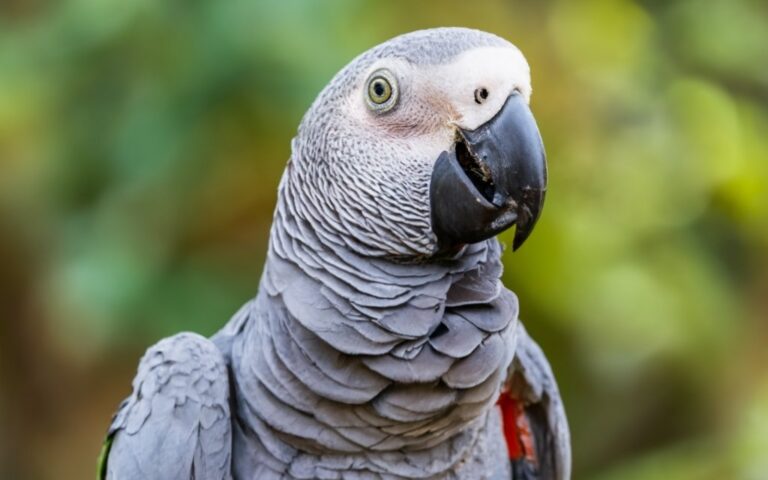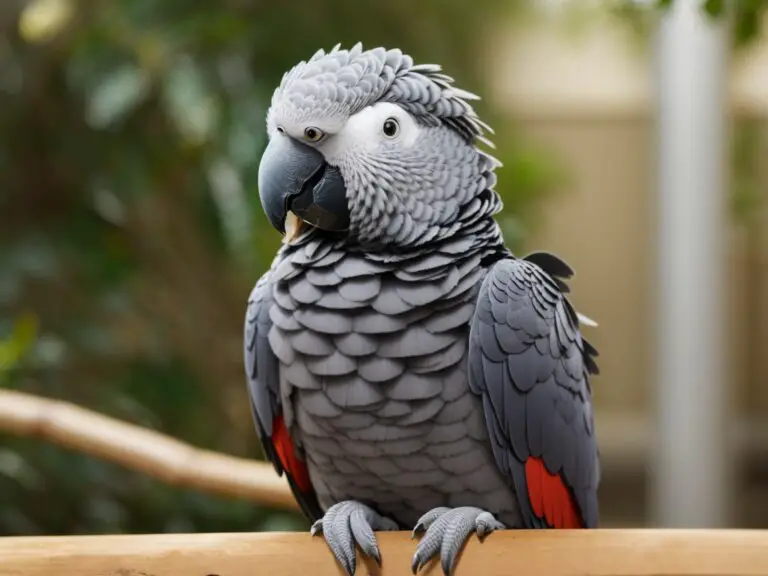Why Is My African Grey Parrot Losing Feathers?
Key Takeaways:
- Feather loss in African grey parrots can be caused by stress, poor diet, hormonal imbalances, or underlying health issues.
- Regular veterinary check-ups and proper nutrition are crucial for preventing feather loss in African grey parrots.
- Environmental enrichment and mental stimulation can help reduce stress and prevent feather plucking in African grey parrots.
- Feather loss can also be a natural and seasonal process in African grey parrots, so it’s important to monitor the overall health and behavior of your bird.
Have you noticed that your African grey parrot is losing feathers?
You’re not alone.
Feather loss in African grey parrots is a common issue that can leave owners feeling worried and uncertain.
As someone who has experienced this firsthand, I understand the frustration and concern that comes with seeing your beloved bird’s feathers thinning or falling out.
In this article, I will share with you the reasons behind this troubling phenomenon, including environmental factors, health issues, and psychological factors.
I’ll also provide you with valuable insights on how to prevent and address feather loss in your African grey parrot.
So, let’s dive in and give your feathered friend the care and attention they deserve!
| Possible Causes | Symptoms | Treatment |
| Malnutrition | Feather plucking, dull feathers, weight loss | Consult a vet for a balanced diet |
| Parasites | Itching, redness, presence of mites or lice | Veterinary treatment for parasite removal |
| Stress or Anxiety | Feather picking, restlessness, aggression | Provide a stress-free environment, behavioral training |
| Disease or Infection | Visible wounds, inflamed skin, lethargy | Seek immediate veterinary attention for diagnosis and treatment |
| Environmental Factors | Exposure to drafts, extreme temperatures | Ensure a comfortable and temperature-controlled living environment |
Understanding feather loss in African grey parrots
Feather loss in African grey parrots can be caused by various factors, and understanding them is important for their overall health and well-being.
Role of feathers in African grey parrots’ health and behavior
Feathers play a crucial role in the health and behavior of African grey parrots. They provide insulation, protection from the elements, and help with flight and balance.
Healthy feathers also indicate overall good health, while feather loss can be a sign of underlying issues.
Additionally, feathers contribute to the parrot’s ability to communicate and socialize with other birds.
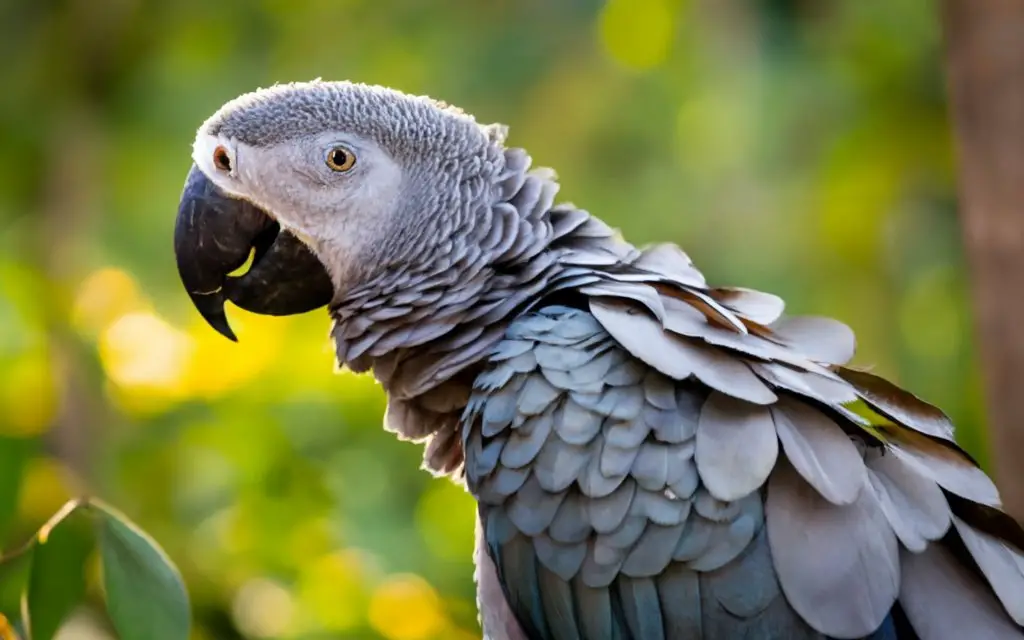
Common reasons for feather loss in African grey parrots
Feather loss in African grey parrots can be caused by various factors. Common reasons include inadequate diet and malnutrition, improper housing and lack of mental stimulation, exposure to toxins and contaminants, health issues like psittacine beak and feather disease or allergies, and psychological factors such as stress, anxiety, boredom, and grief.
Proper nutrition, a stimulating environment, regular veterinary check-ups, and addressing emotional needs can help prevent and address feather loss.
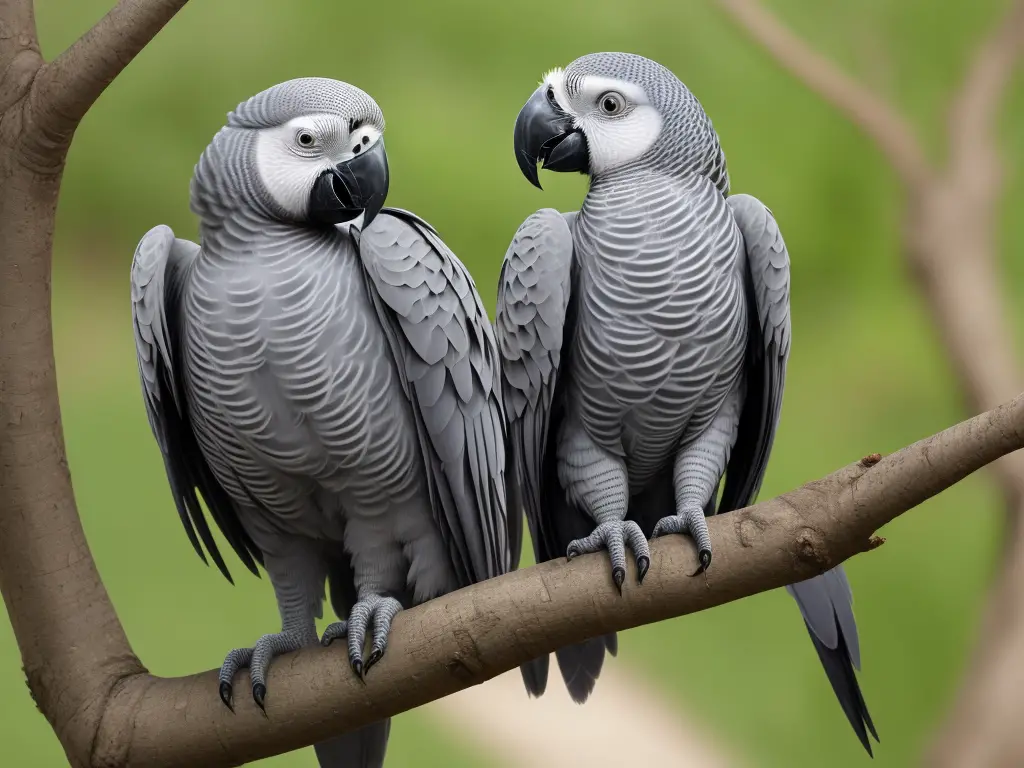
Environmental factors that can cause feather loss in African grey parrots
Feather loss in African grey parrots can be caused by various environmental factors.
Inadequate diet and malnutrition in African grey parrots
Inadequate diet and malnutrition can cause feather loss in African grey parrots. These birds require a balanced diet that includes a variety of fruits, vegetables, nuts, and high-quality pellets.
Lack of essential nutrients like vitamin A, calcium, and protein can lead to poor feather health.
Additionally, feeding them an exclusively seed-based diet can contribute to malnutrition. Providing a proper diet is crucial for keeping their feathers healthy and preventing feather loss.
Improper housing and lack of mental stimulation
Improper housing and lack of mental stimulation are common factors that can contribute to feather loss in African grey parrots. Inadequate living conditions, such as small cages or improper temperature and lighting, can cause stress and anxiety.
Similarly, a lack of mental stimulation, including social interaction and toys for mental enrichment, can lead to boredom and unhealthy behaviors like feather-picking.
Providing a spacious and stimulating environment is essential for the overall well-being of your African grey parrot.
Exposure to toxins and contaminants
Exposure to toxins and contaminants can cause feather loss in African grey parrots. Household cleaning products, insecticides, lead-based paints, and certain plants can be harmful.
Ensure a bird-safe environment and avoid using chemicals near your parrot.
Regularly clean and disinfect their living area to minimize their exposure to toxins.
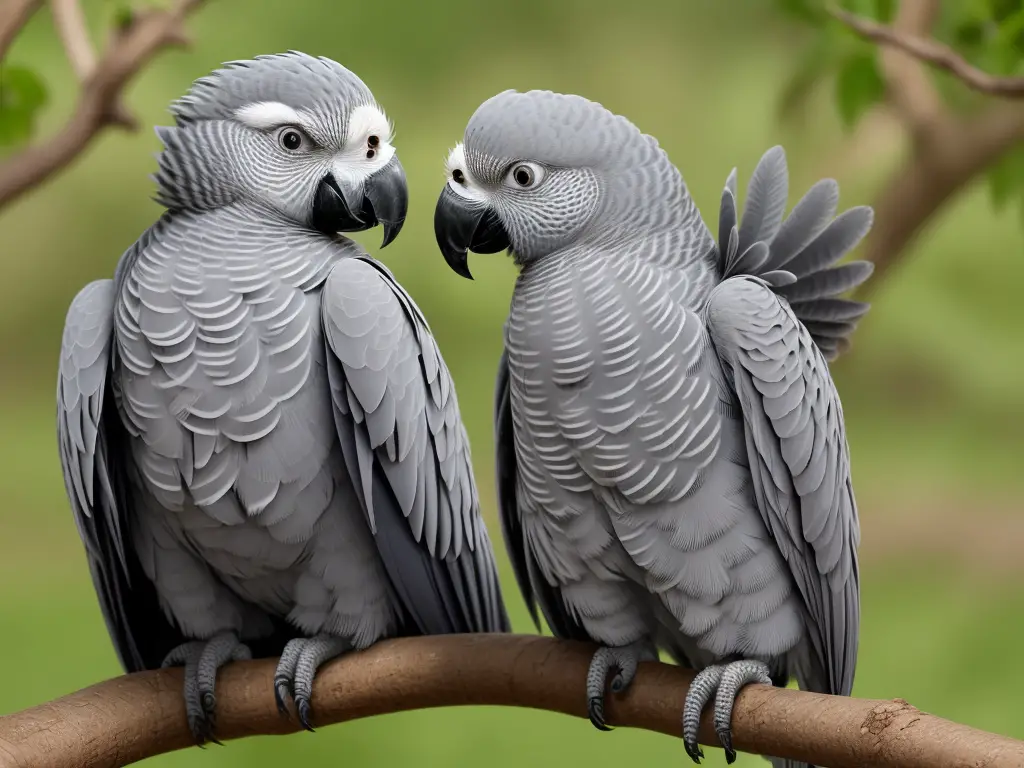
Health issues and diseases that can cause feather loss in African grey parrots
Feather loss in African grey parrots can be caused by health issues like Psittacine beak and feather disease (PBFD), feather-picking behavior, and allergies or skin conditions.
Psittacine beak and feather disease (PBFD)
PBFD is a viral disease that affects African grey parrots and other parrot species. It attacks the feathers, beak, and immune system.
Infected birds often experience feather loss, deformed beaks, and weakened immune systems.
There is no cure for PBFD, so prevention through proper hygiene and testing is crucial.
Feather-picking behavior
Feather-picking behavior refers to when African grey parrots excessively groom or pluck their feathers, leading to feather loss. This behavior can be caused by various factors such as stress, boredom, or emotional trauma.
It’s important to address the underlying cause and provide a stimulating and enriching environment to prevent and address this issue.
Psychological and emotional factors contributing to feather loss in African grey parrots
Psychological and emotional factors can play a significant role in the feather loss of African grey parrots.
Stress and anxiety in African grey parrots
Stress and anxiety can cause feather loss in African grey parrots.
Factors like changes in the environment, lack of social interaction, and emotional trauma can contribute to their stress levels.
Providing a peaceful and stimulating environment, along with regular vet check-ups, can help alleviate and prevent stress and anxiety in African grey parrots.
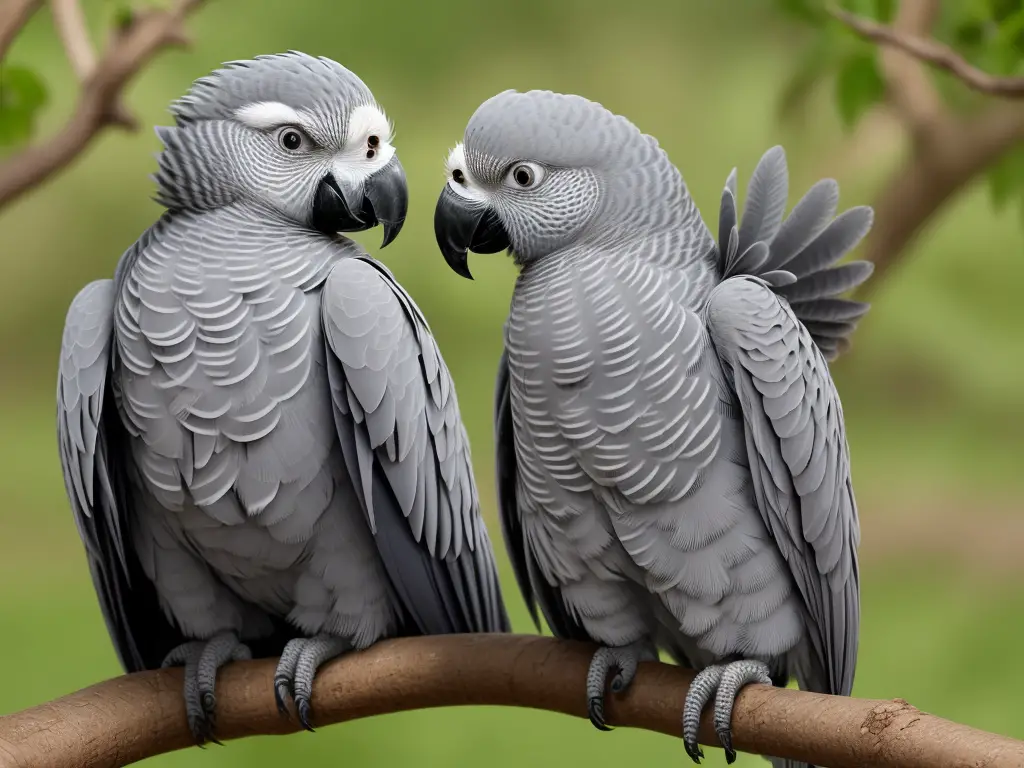
Boredom and lack of social interaction
Boredom and lack of social interaction can contribute to feather loss in African grey parrots. These intelligent birds need mental stimulation, socialization, and attention to thrive.
Providing them with toys, puzzles, and regular interaction with their human companions can help prevent feather loss caused by boredom or loneliness.
Steps to prevent and address feather loss in African grey parrots
To prevent and address feather loss in African grey parrots, focus on providing a balanced and nutritious diet along with creating a stimulating and enriching environment.
Regular veterinary check-ups and monitoring are also important.
Providing a balanced and nutritious diet
To provide a balanced and nutritious diet for your African grey parrot, it’s essential to include a variety of high-quality foods. Offer a base of pellets specifically formulated for parrots, along with fresh fruits, vegetables, and grains.
Supplement with sources of protein like lean meats, eggs, and legumes.
Don’t forget to provide clean, fresh water at all times.
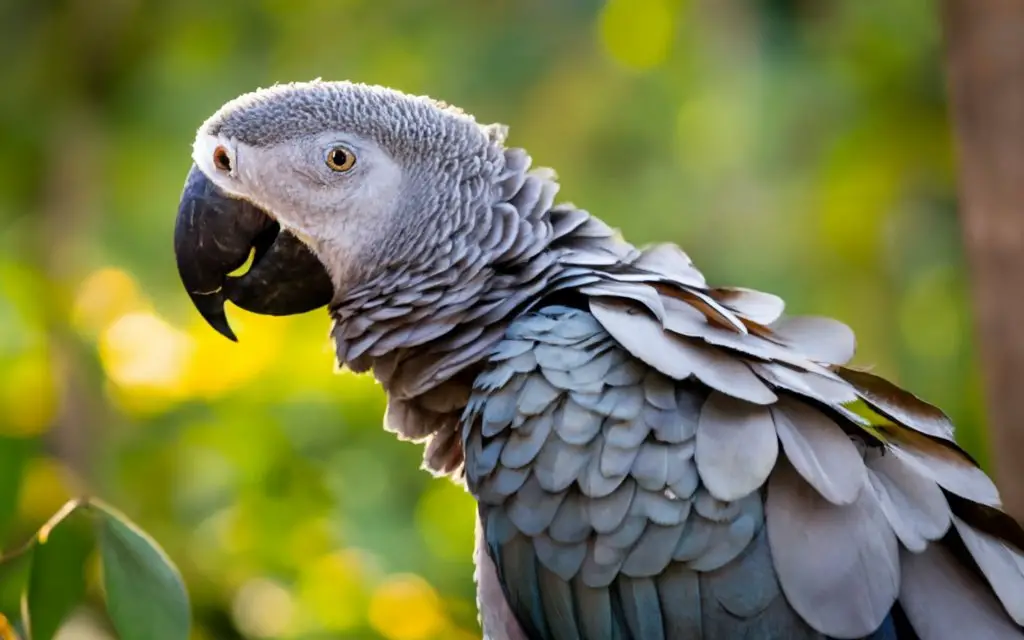
Creating a stimulating and enriching environment
Creating a stimulating and enriching environment for your African grey parrot is essential for their overall well-being and preventing feather loss. Here are a few key ways to achieve this:
- Provide plenty of toys and mental stimulation: African greys are highly intelligent birds and need mental stimulation to thrive. Offer a variety of toys that encourage problem-solving, chewing, and foraging. Rotate the toys regularly to keep them interested.
- Offer social interaction: These parrots are social creatures and need regular interaction with their human caregivers. Spend time talking, playing, and interacting with your African grey on a daily basis.
- Enrich their living space: Create a safe and comfortable living environment with ample space for your African grey to move around and explore. Include perches at different heights and materials for them to chew on, such as safe branches.
- Provide a balanced and nutritious diet: A proper diet plays a crucial role in feather health. Offer a variety of fresh fruits, vegetables, high-quality pellets, and occasional treats. Avoid feeding them foods that are toxic or unhealthy for birds.
- Maintain a consistent routine: African greys thrive on a predictable schedule. Establish a consistent daily routine for feeding, playtime, and rest to help them feel secure and reduce stress.
By incorporating these strategies into your African grey parrot’s daily life, you can create a stimulating and enriching environment that promotes their physical and mental well-being, and helps prevent feather loss.
Regular veterinary check-ups and monitoring
Regular veterinary check-ups and monitoring are essential for maintaining the overall health and well-being of your African grey parrot.
During these check-ups, the vet can assess your parrot’s feather condition, check for any underlying health issues, and provide necessary treatments or interventions.
Regular monitoring helps to identify any changes in your parrot’s feathers or behavior, allowing for early detection and prompt intervention if any issues arise.
Frequently Asked Questions about feather loss in African grey parrots
Can feather loss in African grey parrots be reversed?
Feather loss in African grey parrots can sometimes be reversed, depending on the underlying cause.
If the feather loss is due to inadequate diet, malnutrition, or improper housing, improving these factors can promote feather regrowth.
However, if the feather loss is caused by health issues like psittacine beak and feather disease or feather-picking behavior, it may be more challenging to reverse.
Consulting with a veterinarian is important for a proper diagnosis and tailored treatment plan.
How long does it take for feathers to grow back?
Feathers can take several weeks to months to grow back in African grey parrots.
The exact time frame depends on various factors such as the underlying cause of feather loss, the overall health of the bird, and proper care and nutrition.
It’s important to be patient and provide a conducive environment for healthy feather regrowth.
Can feather-picking behavior be corrected?
Yes, feather-picking behavior in African grey parrots can be corrected through a combination of approaches.
These may include identifying and addressing any underlying health issues, providing mental and physical stimulation, promoting a balanced diet, and creating a calm and stress-free environment.
Working closely with a veterinarian and employing positive reinforcement training techniques can also be beneficial in modifying this behavior.
Final Verdict
Feather loss in African grey parrots can be attributed to a variety of factors, including inadequate diet, improper housing, exposure to toxins, health issues, and psychological and emotional factors.
To prevent and address feather loss, it is important to provide a balanced and nutritious diet, create a stimulating environment, and seek regular veterinary check-ups.
While some cases of feather loss can be reversed, it is crucial to address the underlying causes to prevent recurrence.
With proper care and attention, your African grey parrot can regain its beautiful plumage and enjoy a healthy and happy life.

